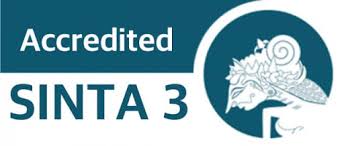THE ETHIC OF SOCIAL MEDIA IN RESPONDING TO HATE SPEECH FROM THE PERSPECTIVE OF HADITH
DOI:
https://doi.org/10.52366/edusoshum.v2i3.53Abstract
Teachers sometimes forget to instill strengthening character education and tend to only teach material so that they can complete all the material in the curriculum. The teacher should be able to further increase the cultivation of strengthening character education to students with various activities, one of which is by instilling character education through textbooks and habituation. This study aims to implement In House Training steps in an effort to improve teachers' abilities in implementing strengthening character education and increasing teachers' abilities in implementing strengthening character education through In House Training at Kranggan Kapanewon Galur Public Elementary School. This research was conducted at SD Negeri Kranggan Kapanewon Galur, Kulon Progo Regency. This research is a School Action Research. The research subjects were Class I-VI teachers at SD Negeri Kranggan Kapanewon Galur, Kulon Progo Regency. Research procedures through planning, implementation, observation or observation, and reflection. Data collection techniques through observation, documentation, field notes and research instruments. Data analysis techniques using qualitative analysis. The results of the study show that the In House Training steps to improve the ability of class teachers in implementing strengthening character education at SD Negeri Kranggan Kapanewon Galur are through a process of planning and implementing which has increased the success rate of 91,6% with category A in Cycle I and 100% with category A in Cycle II. Teacher's Ability to Apply Strengthening Character education increased by an average of 72.35% in Cycle I with category C, increased again to 86.5% in Cycle II with category B.
References
Bhat, A. M. (2014). Review Freedom of Expression from Islamic Perspective. Journal of Media and Communication Studies, 6(5), 69–77.
Brison, S. J. (1998). The Autonomy Defense of Free Speech http:/ /www.jstor.org/ stable/ 10.1086/ 233807 diakses 11-05-2016 14:57. Chicago Journals. The University of Chicago., 108(2), 313.
Dahlan, M. S. (2014). Etika Komunikasi dalam al-Qur’an dan Hadis. Jurnal Dakwah Tabligh, 15(1).
Djafar, A. M. (2018). (In)toleransi Memahami Kebencian & Kekerasan Atas Nama Agama. Jakarta: PT. Elex Media Komputindo.
Gagliardone, & Iginio, D. (2015). Countering Online Hate Speach. Paris: United Nations Educational, Scientific, and Cultural Organization.
Gelber, K. (2002). Speaking Back, Free Speak versus Hate Speech Debat. Amsterdam: John Benjamins Publishing Company.
Harefa, N. R. (2020). Implikasi Perubahan Undang-Undang Informasi dan Transaksi Elektronik Terhadap Tindak Pidana Ujaran Kebencian (Hate Speech). Jurnal Hukum, 1(1), 1–10.
Jokowi, H. S. on S. M. C. P. (2018). Hate Speeches on Social Media Concern President Jokowi (24 May 2018), http://bit.ly/hatespeeches, accessed 25 May 2018.
Kapolri, S. E. (2015). Surat Edaran Kapolri Nomor SE/6/X/2015 tentang Penanganan (Hate Speech) Ujaran Kebencian.
Khairuldin, N. A. S. and W. M. K. F. W. (2017). Freedom of Speech in Islam and its Connection with Street Demonstrations. International Journal of Academic Research in Business and Social Sciences, 7(4), 122–129.
Krogt, C. J. van der. (2014). Why Is Freedom of Speech a Problem for So Many Muslims, in Freedom of Speech and Islam, Erick Kolig, ed. Farnham, Surrey, England and Burlington, USA: Ashgate.
Nugroho, Y., Siregar, M. F., & Laksmi, S. (2012). Memetakan Kebijakan Media di Indonesia, s.l. Centre for Innovation Policy and Governance.
Nurcholish, A. (2017). Merajut Damai dalam Kebhinekaan. Jakarta: PT Elex Media Komputindo.
Others, W. M. K. F. W. K. and. (2016). Freedom of Speeches by Mufti According to Islam: Implication to Fatwa in Malaysia. International Journal of Academic Research in Business and Social Sciences, 6(12), 847–57.
Pradipta, A. (2016). Fenomena Perilaku Haters di Media Sosial” dalam Skripsi, Jurusan Ilmu Komunikasi Fakultas Ilmu Sosial dan Ilmu Politik Universitas Diponegoro Semarang. Retrieved from Semarang:
Saptarini, A., & Wildana, D. T. (2020). Eksistensi Penganut Aliran Kepercayaan dan Kompleksitas Hak Kebebasan Beragama di Indonesia’, in Al-Khanif, Herlambang P. Wiratraman, and Kusuma P. Manunggal (eds.). Dialektika Universali: Hak Asasi Manusia.
Speech, I. U. to L. H. (2017). Indonesians Urged to Leave Hate Speech, accessed 8 Apr 2018. Bangkok: Asia News Monitor.
Syaibani, R. (2012). Studi Kepustakaan, (Online), (http://repository.usu.ac.id/ bitstream, diakses 4 Oktober 2016).
Yohan. (2016). Hate Speech dan Dampak Media Sosial Terhadap Perkembangan Komunikasi.
Zed, M. (2004). Metode Penelitian Kepustakaan. Jakarta: Yayasan Obor Indonesia.













